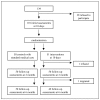Effectiveness of a single-session early psychological intervention for children after road traffic accidents: a randomised controlled trial
- PMID: 20181120
- PMCID: PMC2841102
- DOI: 10.1186/1753-2000-4-7
Effectiveness of a single-session early psychological intervention for children after road traffic accidents: a randomised controlled trial
Abstract
Background: Road traffic accidents (RTAs) are the leading health threat to children in Europe, resulting in 355,000 injuries annually. Because children can suffer significant and long-term mental health problems following RTAs, there is considerable interest in the development of early psychological interventions. To date, the research in this field is scarce, and currently no evidence-based recommendations can be made.
Methods: To evaluate the effectiveness of a single-session early psychological intervention, 99 children age 7-16 were randomly assigned to an intervention or control group. The manualised intervention was provided to the child and at least one parent around 10 days after the child's involvement in an RTA. It included reconstruction of the accident using drawings and accident-related toys, and psychoeducation. All of the children were interviewed at 10 days, 2 months and 6 months after the accident. Parents filled in questionnaires. Standardised instruments were used to assess acute stress disorder (ASD), posttraumatic stress disorder (PTSD), depressive symptoms and behavioural problems.
Results: The children of the two study groups showed no significant differences concerning posttraumatic symptoms and other outcome variables at 2 or at 6 months. Interestingly, analyses showed a significant intervention x age-group effect, indicating that for preadolescent children the intervention was effective in decreasing depressive symptoms and behavioural problems.
Conclusions: This study is the first to show a beneficial effect of a single-session early psychological intervention after RTA in preadolescent children. Therefore, an age-specific approach in an early stage after RTAs may be a promising way for further research. Younger children can benefit from the intervention evaluated here. However, these results have to be interpreted with caution, because of small subgroup sizes. Future studies are needed to examine specific approaches for children and adolescents. Also, the intervention evaluated here needs to be studied in other groups of traumatised children.
Clinical trial registry: ClinicalTrials.gov: NCT00296842.
References
-
- European Child Safety Alliance. Childhood road safety: facts. Amsterdam: EuroSafe; 2007.
-
- Meiser-Stedman R, Dalgleish T, Smith E, Yule W, Bryant B, Ehlers A, Mayou RA, Kassam-Adams N, Winston F. Dissociative symptoms and the acute stress disorder diagnosis in children and adolescents: a replication of the Harvey and Bryant (1999) study. J Trauma Stress. 2007;20:359–364. doi: 10.1002/jts.20211. - DOI - PubMed
Associated data
LinkOut - more resources
Full Text Sources
Medical


